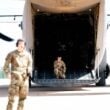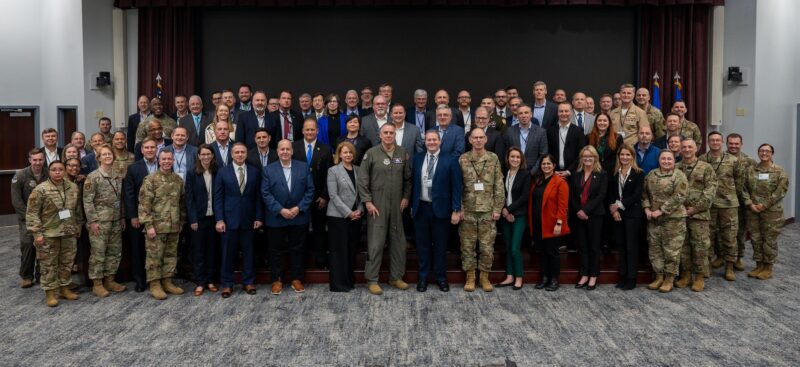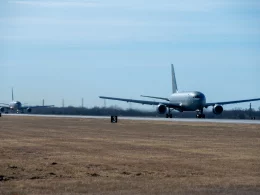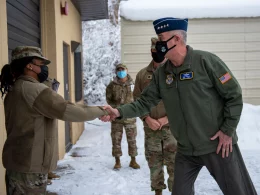SCOTT AIR FORCE BASE, Ill. —
Air Mobility Command (AMC) hosted a Joint Industrial Capacity and Capabilities Board Feb. 27, 2024, that brought together key leaders from the aerospace industry along with academia and national associations to discuss the industry’s concerns and the ability of the nation to shift production to support competition and conflict as outlined in the National Defense Strategy.
Tri-chaired along with Air Force Materiel Command (AFMC) and the Air Force Assistant Secretary for Acquisition, Technology and Logistics (SAF/AQ), the board worked to understand specific challenges in the aerospace industry (workforce, materials, manufacturing) that impact industrial capacity and capabilities required to sustain global Mobility Air Forces. Additionally, the Air Force aims to further understand industry’s ability to shift from producing commercial aviation materials and equipment to the production of military aviation materials and equipment.
“Our desire is that we sync up our efforts,” said Honorable Andrew Hunter, SAF/AQ assistant secretary. “We have to centralize, but we also have to integrate our efforts between government and industry. The key will be spending a little bit of time talking about where we go from here, how [do] we continue this conversation and collaboration.”
The JICCB was comprised of experts across all three organizations that spent the day with industry leaders identifying challenges and potential solutions to improve aviation production requirements at the tempo needed to win.
“We’re learning about each other, having honest conversations, and trusting each other enough to tell the truth,” said Gen. Mike Minihan, Air Mobility Command commander. “This is a powerful day to get stuff done so we walk out of here knowing where we need to go.”
The need for discussions with civilian industry partners come from the intricate relationship between military preparedness and industrial capabilities. By engaging with the commercial aviation sector, the Air Force aims to address potential challenges related to accelerating production during contingencies and times of conflict ahead of need. This collaboration is essential for several reasons:
Adaptability and Agility for the Force: Collaboration allows the military to rapidly respond to conflict and send a demand signal to industry, ensuring a rapid response during conflicts.
Capacity Assessment: Assessing the aviation industry’s production capacity and capabilities provides the understanding needed to inform deliberate planning for competition and conflict.
Timely Transition: Understanding timelines of the aviation industry to accelerate production is crucial. This information also informs deliberate planning and ensures timely availability of essential military aviation materials and equipment.
Resource Allocation: Identify potential investments and non-monetary support necessary to facilitate a smooth transition between commercial and military production.
These discussions with civilian industry partners align with AMC’s commitment to enhancing the joint force’s readiness and capability. By fostering collaboration, AMC, in conjunction with SAF/AQ and AFMC, aimed to leverage the strengths of both military and civilian sectors, contributing to a more resilient and adaptable defense posture.
“I’m asking you to do it from an American citizen perspective. Yes, you’re here representing your company, your industry, but I think there’s a way to satisfy both. I think we can satisfy national interests and your company’s interests all at the same time,” commented Gen. Duke Richardson, Air Force Materiel Command commander.
In 1940, the United States was found to be underprepared for a conflict with the Axis powers before WWII. Through a tightened relationship between commercial industry and the government, the United States was able to shift industry production from commercial to military, leading to victory in the war. The AMC-hosted forum aims to follow that model and leverage a similar relationship with the commercial aviation industry. AMC is planning a follow-on event in June 2024.
“The factors that are relevant for us is that the supply chain is challenged, there is not a whole of government [effort], and there are workforce issues that didn’t exist in the ‘40s. If we lose, nobody cares about all that. This is about the decision to deal with the freedom forge that’s relevant for our time, not to replicate what our grandparents did,” said Minihan.










